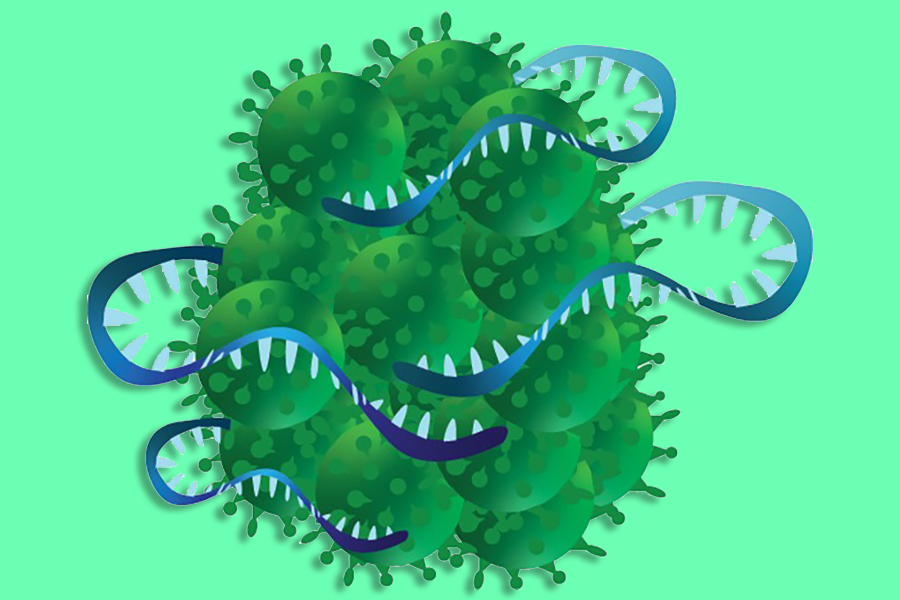True or false? From vaccines to variants, Dr. Julie Higashi explains it all
SPIKES: mRNA vaccines like Pfizer’s and Moderna’s cause cells to produce a spike protein, which stimulates the production of antibodies against it that will attack Covid’s spike proteins if the body encounters them.
September 27, 2021
To separate fact from fiction, the Boiling Point asked Dr. Julie Higashi, who has served on Shalhevet’s Medical Task Force and the mother of sophomore Tomomi Shaw, to answer student questions about Covid-19, masks, vaccines, and other topics.
Dr. Higashi is an infectious disease specialist who has been working in disease control since 2006. She completed an infectious disease fellowship at UCSF after graduating from the Medical Scientist Training Program at Case Western Reserve with two degrees: and M.D. and a Ph.D. in Biomedical Engineering.
Now a national leader in tuberculosis control, Dr. Higashi has been president of both the National and California tuberculosis controllers associations, and has regularly participated in Congressional briefings for World Tuberculosis Day.
The true-false questions below are a combination of questions submitted through an anonymous Google form posted on Schoology and questions written by BP staff based on their own curiosities and questions they have heard being asked among students. Dr. Higashi was interviewed Sept. 13.
BP: True or false? The vaccine is not effective. That is why there is a booster shot, people who are vaccinated still get sick and can spread the disease to others. Why are they pushing it so much if it doesn’t even work?
Dr. Higashi says… Vaccines are not going to prevent all infections, but they can reduce infections. We develop vaccines to do a number of things. The most important thing is to save lives, we know Covid is a deadly disease. The rate of disease for Covid for death is about 1% — that’s one out of 100 people who get Covid. If you are vaccinated you reduce your chances of dying if you get Covid by tenfold. You’re 10 times less likely to end up in the hospital, and you’re five times less likely to be infected, and that’s with the Delta variant.

By reducing infections, vaccines save lives, not only of the people who are vaccinated, but also the people around them who are more vulnerable. I want people to be vaccinated because I want to have fewer chances to be exposed. I want fewer chances for my family being exposed. I want fewer chances for vulnerable people to be exposed.
In regards to the booster shot, we need booster shots for many things. For example with the hepatitis B vaccine, you do a series of three, and then you periodically may need another shot because the immunity wanes. And we get a flu shot every year.
I could see a future in the near term, where the Covid shot is an annual shot. I hope it will be a combo shot so you only need one, that would cover both flu and Covid. I think it’s quite possible we’re going to be getting an annual Covid shot.
True or false? If you got the Covid vaccine, you can’t become infected with or spread Covid.
Dr. Higashi says … That’s false. If you do get the Covid vaccine, you are much less likely to be infected. The MMWR [Morbidity & Mortality Weekly, a just reported on Friday that you’re five times less likely to be infected if you’re vaccinated.
Can you spread Covid even if you are vaccinated? I think it depends. There is data that says if you’re asymptomatic, and you have Covid, which happens, you’re much less likely to be super infectious, so you’re much less likely to spread. If you got the Covid vaccination, even if you get a breakthrough infection, you will be much less likely to spread Covid. Obviously, if you don’t get Covid at all that’s the best way of not spreading it.
True or false? Covid can’t be spread outdoors.
Dr. Higashi says… It depends. If you are outside you are so much safer than if you are indoors. Nothing is 100%, but you are significantly less likely to get Covid if you’re outdoors.
There’s places where it’s been outdoors, but you’re still kind of enclosed. An example would be if you were just at a mega-event, so a concert, and people are just smashed together — that’s why there are some additional rules that people still need to wear masks when they’re outdoors.
Even if you’re outdoors you could potentially be crowded enough and there might be enough aerosols that you could actually get Covid. But it’s really hard to get Covid outdoors.
True or false? Covering your mouth is more important to prevent the spread of Covid than covering your nose.
Dr. Higashi says…: That is definitely false. You really need to cover both your mouth and nose. Otherwise you’re just kind of cheating. It’s all about aerosols coming out of your mouth and nose. Primarily the way Covid is spread is through breathing in those aerosols.
One of the reasons Delta is so transmissible is that the levels of virus found in the nose and throat are orders of magnitude higher than the original virus. So if you don’t cover your nose and happen to be carrying Covid-19, you can release a lot of virus particles in the air.
True or false? I had Covid already and I have antibodies, so I’m already immune and I don’t need the vaccine because I cannot become reinfected later on.
Dr. Higashi says… The answer is no, you can get it again. Some people just have bad luck, and they get reinfected.
Actually, people who have had Covid and are vaccinated are the least likely to be reinfected. Because they have a boosted antibody response from the vaccine.
This is an emerging illness, we’re still learning about it. I don’t think anybody can feel completely protected, and that’s unfortunate. We’re kind of in this situation until we have pretty much vaccinated the world, or the world has had the opportunity to be vaccinated, or to have had Covid. The idea is we’re not gonna get out of this until everybody is as protected as possible. We need community immunity. When people elect not to be vaccinated, they’re weakening the foundation of our ability to prevent widespread outbreaks.
True or false? Mask wearing is a substitute for social distancing, and social distancing is a substitute for mask wearing.
Dr. Higashi says… The answer is complicated. When we started talking about Covid originally, it was described as a droplet disease. How do you protect yourself from a droplet disease? That’s where the social distancing came in, where that six feet distance requirement came into play. Because we know that for droplet diseases, diseases transmitted by droplets which are larger than aerosols, it’s that six feet of distance that is going to protect you.
Early on people were whispering to me, “This is an airborne disease,” and it took a while for that idea to be accepted. The truth is — I’m gonna say this over and over again — this is the way science works. It’s not all or none. So most diseases, most of the time, they’re going to be transmitted predominantly the way that they are transmitted. If it’s by droplet, there usually is an aspect of airborne transmission. And it’s just a matter of what is the predominant way that this disease is transmitted.
Covid is an airborne-transmissible disease. If it’s an airborne transmissible disease, it’s more important that people wear masks, and the social distance helps but it’s more important to wear the masks. The reason we want the six feet is because then you just have fewer people, less crowding, less people to generate aerosols and that’s generally better. The fewer people, the better.
The six feet helps protect you quite a bit; and masking prevents both spread and infection. With airborne, you need the masks to prevent spread and protect from inhaling, and the distancing is not as helpful.
True or false? The Covid vaccine can lead to infertility.
Dr. Higashi says… There’s no basis for that fear. That is just misinformation. It’s just misinformation and you get both the obstetrics community, pediatric community, the entire sort of medical community, really. This is not a concern with the vaccine.
True or false? The Covid vaccine can cause autism.
Dr. Higashi says … There is no information at all [showing this]. Vaccines do not cause autism. That was misinformation from decades ago. The physician or the scientist that reported autism related to vaccines : the publication was discredited, he really lost his scientific credibility. But it persists, this idea of vaccinations related to autism persists. But it is not related.
True or false? Kids don’t get long-term Covid.
Dr. Higashi says … I don’t think that’s true. I think that unfortunately, long-term Covid can affect children. We haven’t had a lot of time to understand who’s at risk for it. That’s all in flux. I think anybody that has an immune system — because it’s probably related to an immune response of some sort that’s deregulated — is at risk for developing long-haul Covid, and we’re just going to have to spend a lot of time, effort, energy, addressing how to diagnose and manage it.
There are going to be so many people who are going to be left with long-haul Covid because they may not have been able to be vaccinated or protected before having a Covid infection.
True or false? Taking a medication like Advil or Tylenol while infected with Covid will prevent you from being contagious and spreading the virus.
Dr. Higashi says… Unfortunately, it will not. While it will make you feel a whole lot better, it doesn’t mean that you’re less infectious. The thing about Covid is the infectiousness actually happens right before you become symptomatic; that’s when you’re the most infectious. But that’s not fully related to your question, but no, ibuprofen does not help you become less infectious.
True or false? If you take a Covid test the day after you were exposed to Covid (as opposed to three days later) the results are unreliable.
Dr. Higashi says… That’s true. Typically, it takes one to two days. and then the wait to get tested should be about 4 or 5 days after the exposure.
True or false? The Delta variant is more than 2x as contagious as previous variants and there is data suggesting the Delta variant might cause more severe illness than previous strains.
Dr. Higashi says… It is two times more transmissible, and because of how this works mathematically, that means each person is likely to spread to as many as six people, whereas with the original strain they would have spread to only one or two.
But it seems like in children at least it is not more severe. It’s just that since one person’s going to infect way more people, if a percentage of those people end up in the hospital, the absolute number of those people — in this case children — is going to be greater than with the previous strain.
Unfortunately, though, it does seem that there are so many kids who are affected that the hospital beds in the ICU for kids were just at the breaking point.
The only way to protect kids right now is for the rest of the community to be vaccinated. People 12 and older who are not getting vaccinated, they’re leaving the kids vulnerable. It looks like the earliest we are going to get authorization for vaccines for kids under 12 will be some time in October or November.
Also, even though Delta is isn’t more deadly or virulent in children, in adults the outcomes for hospitalization and death are really much worse than the original strain. So teenagers can protect their parents – yes, even people over 40 are more vulnerable — and grandparents by getting vaccinated.
True or false? Reactions and side effects from the Covid vaccine are rare.
Dr. Higashi says… That is not true. Most people have a reaction once they get a Covid vaccine. Some of the reactions are mild and are just arm soreness. But some people have a strong response, they have a good immune response. That’s not you being sick. That’s your immune response, it means that you’re really generating immunity against the vaccine.
There are ways to manage that reaction. Typically the first dose doesn’t give you side effects. If, as long as you’ve never had Covid before, if you’ve had Covid, then you’re probably going to get a more vigorous reaction even with the first shot.
True or false? The Covid-19 vaccine is safe and is based on years of scientific research.
Dr. Higashi says: It is safe, and the knowledge that it took to put the vaccine together was years, decades, in the making. The actual development of the Covid vaccine was, you know, a year or so. But it was science that was really developed before, and what happened was the world came together, and really put all its resources into developing this vaccine because we needed to.
It is safe.
With the mRNA vaccines, which are the Pfizer and the Moderna vaccines, this was a new way of putting together a vaccine. And I really think, based upon the way this vaccine has performed and the way that the future vaccines can be developed, that we won’t need to wait a year to make a vaccine for flu — I think the flu vaccine is going to become a mRNA vaccine.
The way the flu vaccine is developed now, you have to guess from six months prior to developing the vaccine what the best strains are to choose to put into the vaccine for flu. With this mRNA technology you don’t need that six months. You can put together, and select and understand which strains are causing the most problems and the worst disease, a month or two before you need to put it together.
It’s such a beautifully clean vaccine from the standpoint of the way it’s developed, the way that it interacts with your body, which is, it doesn’t leave a trace. Anybody who’s worked with mRNA in the lab knows that it just deteriorates, it just doesn’t stick around. And so that’s why I just really love this approach, because it isn’t gonna stick around in the body, right? It isn’t gonna mess with your DNA. This is the vaccine platform of the future and it’s going to cure more than just Covid. I think it’s going to cure HIV, I think it’s going to cure tuberculosis. It’s what we’ve been waiting for for a long time.
This has been decades of developing research. We had to know what the virus was, we needed to know that code in order to put the right messages of mRNA. That’s what was quick. But the concept of how the vaccine works and how to test the vaccine was not rushed.














